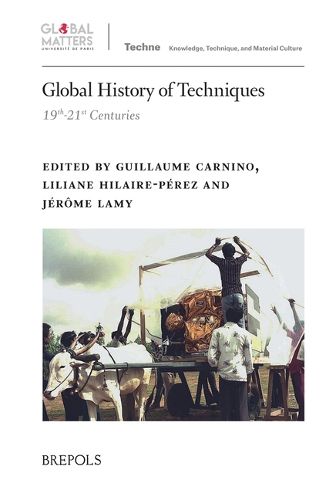Readings Newsletter
Become a Readings Member to make your shopping experience even easier.
Sign in or sign up for free!
You’re not far away from qualifying for FREE standard shipping within Australia
You’ve qualified for FREE standard shipping within Australia
The cart is loading…






It is impossible to understand our societies without apprehending their technical roots, which constitute the foundations of our political, economic, cultural, and everyday world. This book offers for the first time a synthesis of the global history of contemporary techniques, based on the contributions of recent historiography. Gathering more than fifty specialists of the history of technology, we present an overview of technical evolutions on a global scale. As such, the book accounts for a diversity that challenges both teleological approaches on progress and Eurocentric perspectives. It explores the complex socioeconomic implications of techniques as well as the system of representations and power strategies that led to the emergence of our contemporary world. The purpose is to decentre the history of technology. In this perspective, a central question concerns the very category of the history of technology, i.e. the term ‘technology.’ Refusing both the limitations of ‘technology’ and of ‘useful knowledge’, we reaffirm the necessity to study techniques as embodying human activity as a whole. In that sense, history is tied to anthropology and ethnology. This book follows a three-part organization. The first section opens with a world tour of techniques, restoring the complexity of regional historiographies and of the meanings given to technical activities in society. The second part focuses on sectors of activity, processes, and products with a strong emphasis on means of production and communication, the exploitation of natural resources, major technical systems, infrastructures and networks. The final section provides access to major cross-related issues (devoting much attention to the role played by technology in globalization, particularly through colonization, imperialism, and the extension of large technical systems).
$9.00 standard shipping within Australia
FREE standard shipping within Australia for orders over $100.00
Express & International shipping calculated at checkout
It is impossible to understand our societies without apprehending their technical roots, which constitute the foundations of our political, economic, cultural, and everyday world. This book offers for the first time a synthesis of the global history of contemporary techniques, based on the contributions of recent historiography. Gathering more than fifty specialists of the history of technology, we present an overview of technical evolutions on a global scale. As such, the book accounts for a diversity that challenges both teleological approaches on progress and Eurocentric perspectives. It explores the complex socioeconomic implications of techniques as well as the system of representations and power strategies that led to the emergence of our contemporary world. The purpose is to decentre the history of technology. In this perspective, a central question concerns the very category of the history of technology, i.e. the term ‘technology.’ Refusing both the limitations of ‘technology’ and of ‘useful knowledge’, we reaffirm the necessity to study techniques as embodying human activity as a whole. In that sense, history is tied to anthropology and ethnology. This book follows a three-part organization. The first section opens with a world tour of techniques, restoring the complexity of regional historiographies and of the meanings given to technical activities in society. The second part focuses on sectors of activity, processes, and products with a strong emphasis on means of production and communication, the exploitation of natural resources, major technical systems, infrastructures and networks. The final section provides access to major cross-related issues (devoting much attention to the role played by technology in globalization, particularly through colonization, imperialism, and the extension of large technical systems).